In light of the concern and spread of the COVID-19 Novel coronavirus that has gripped the world, I was invited to a talk organised by PanAsia Surgery Group about how our gut health can affect our risk of getting infections and how we can boost our immunity with the right diet and supplements.
The educational and informative session, which took place over a lunch gathering at Cedele, Wheelock Place, had been attended by media guests.

The talk had been conducted by Dr. Melvin Look, a consultant gastrointestinal and laparoscopic surgeon with the PanAsia Surgery Group.
Supercharging our immunity to fight COVID-19 virus
And according to Dr. Look, whilst having good personal hygiene and washing our hands frequently with soap are crucial, we also need to take preventive measures to supercharge our immunity and strengthen our health.
While we know how the COVID-19 virus transmits, that is, through close person-to-person contact through respiratory droplets and that it is commonly talked-about in the media how important cleaning and disinfecting our hands and wearing a mask are, Dr. Look pointed out that what we don’t realise in terms of contracting and fighting of viruses, is the strength of our own immune system.

Said Dr. Look, “This is why not everyone will get the virus if there is someone amongst us with the virus. Some are more susceptible than others because their immune system is weaker.”
He continued, “In terms of influenza, this is also why some people get a mild flu whereas others have a severe reaction to the same flu bug and develop critical complications. Not enough is being talked about, in terms of telling the community how to be healthy and to enhance your own immunity.”
How the immune system functions
Dr. Look proceeded to explain the functions of the immune system, that is, how it distinguishes and identifies the potential threats to our body and eliminates them.
 He added, “When your immune system goes wrong, you get autoimmune diseases where the body’s immune system is attacking the body’s own cells.”
He added, “When your immune system goes wrong, you get autoimmune diseases where the body’s immune system is attacking the body’s own cells.”
The doctor also explained how many people do not realise that the gastrointestinal tract forms a major part of the immune system, about 70 per cent.
He said, “So if you don’t have a strong gut barrier, imagine all the toxins and other substances leaking into the body from your food and waste produce.”
Generally children have a stronger immunity than adults, as evidenced by chickenpox, a virus which is usually a mild illness that children recover from, but in adults, it can become a serious illness.
Said the doctor, “We believe that as you get older, the bone marrow produces less T-cells and stem cells and this results in the gut being able to absorb less nutrients from our food. The lack of micronutrients being supplied to the body means that we do not have as strong an immune system as we should have.”
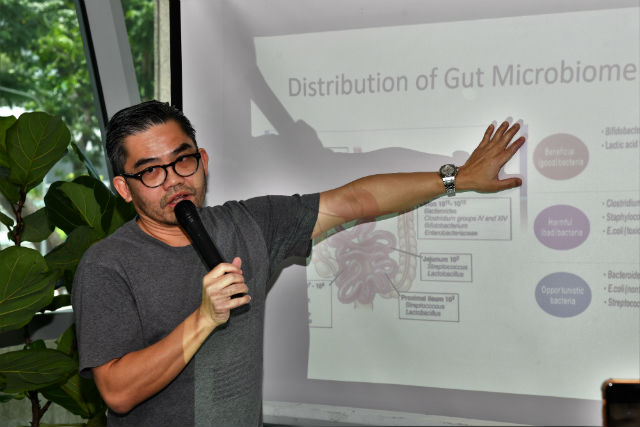
As well, those who are obese or have diabetes also tend to have a poor immune system and this may manifest in the form of allergies.
Explained Dr. Look, “So to have a working immune system, we need a healthy gut. If you have poor eating habits, and you do not have nourishments to boost your immune system, your body will malfunction and suffer.”
Diet and our immune system
Your diet has a important role to play in your immune system, according to Dr. Look.
He said, “So the first thing you should do is to stop eating sugar, because bacteria and viruses thrive on sugar. The more sugar you eat, the easier it is for them to get a foothold into your body. A lot of people don’t realise this. Also, increase your intake of plant-based whole foods, to give you good micronutrients.”
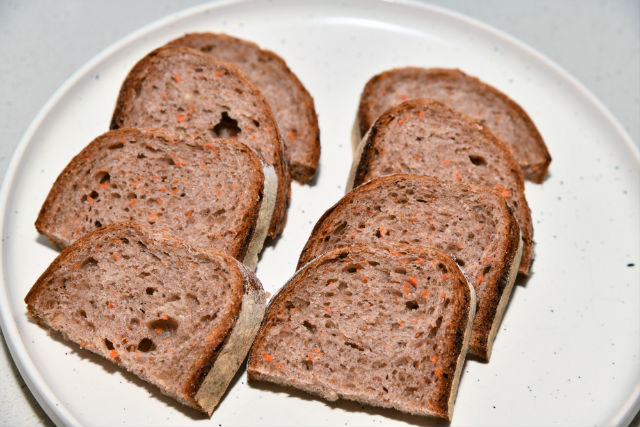
As well, Dr. Look also added that practising intermittent fasting has been scientifically proven to promote autophagy, a process whereby the white blood cells in the body eat up the unhealthy cells, that is, the cells that have mutated and become infected with parasites and bacteria.
Micronutrients essential to the body
Some of the micronutrients that boost the body’s immune system include zinc, selenium, vitamins C, B6, E and A, as well as iron, copper and folic acid.
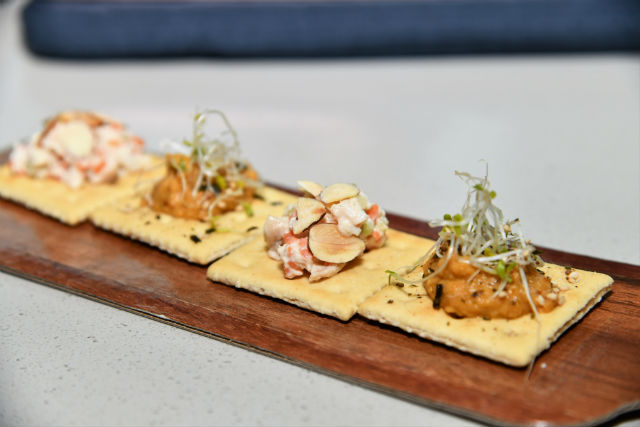
Vitamin C, which comes from citrus fruits, oranges, grapefruits, as well as spinach and kale, is an immune booster, but it’s unable to be stored or produced by the body, so it is important to consume Vitamin C everyday.
Vitamin B6, which is from foods like chicken, cold water fish like salmon and tuna, and green vegetables and chickpeas, is important in maintaining biochemical reactions in the body.
Vitamin E, from nuts, seeds and spinach, is an antioxidant that is good in fighting infections, but should not be taken in large quantities via supplements, as this may be toxic to the body.
Vitamin D is a natural hormone that is produced by the body when it is exposed to sunlight. It is also a pro-survival molecule and helps you fight against infections and viruses.
While Vitamin D can be found in natural food sources such as salmon, sardines, egg yolk and shrimps, as well as fortified sources such as milk and yoghurt, Dr. Look stressed that sunlight is still the best source for Vitamin D.
“So go out in the sun and get some fresh air. As well, viruses like COVID-19 cannot live in the heat for very long. They like cold, hard surfaces,” added Dr. Look.

Other factors to supercharge our immune system
Besides making change to our diet, Dr. Look added that there are other things that we can do, in order to boost our gut health and natural immunity against viruses.
Smoking is a key factor that leads to poor immunity against viruses, especially COVID-19 which is a respiratory disease, as well as having high levels of stress and getting inadequate sleep.
Said Dr. Look, “If you are under stress, your immune system cannot work well, so try and find time to meditate and relax yourself.”
He also continued, “Also, sleeping allows the body to repair. An average adult should sleep for seven to nine hours per day as this helps the body to rejuvenate itself. However not many of us are achieving that.”
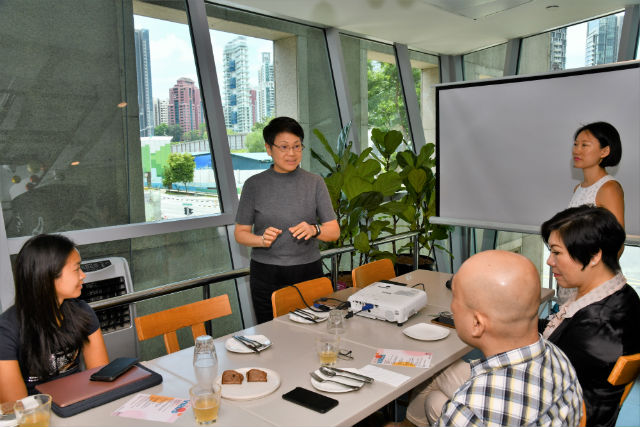
Exercise too, is an important factor to have a good gut health. Said Dr. Look, “This promotes good health and blood circulation. You don’t need to do rigorous exercise; just something that increases your heart rate for 45 minutes, five times per week. Go for a brisk walk or a jog in the sun; that is the best advice I can give.”
Gut health and the gastrointestinal system
And in terms of gut health, Dr. Look proceeded to explain that there are five major criteria for a healthy gastrointestinal system. These are effective digestion & absorption of food, absence of gastrointestinal illness, normal & stable intestinal microbiota, effective immune system and status of well-being.
Said the doctor, “These play an important part in your quality of life. If you have a healthy gut, you can eat anything you want without consequences. Some people are prone to diarrhoea, loose stools and constipation, because they have poor gut health.”
As well, other diseases that are linked to gut dysfunction, according to Dr. Look, also include arthritis, autoimmune conditions, obesity, fatty liver disease, fibromyalgia and chronic pains. Alzheimer’s and Parkinson’s disease are also influenced by poor gut health, as with major cases of depression.
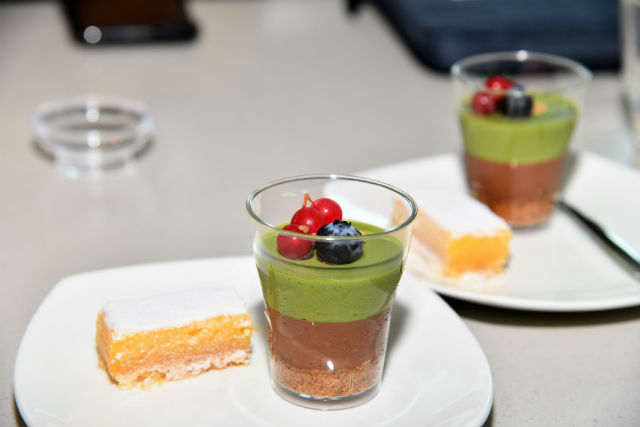
He also continued, “Good gut health gives you a good sense of well-being. You can enjoy your food and have good bowel movement at the same time. We are beginning to realise that it is not enough to have a good brain and cardiovascular health. Gut health is also becoming increasingly important.”
Foods and gut health
So what types of food disrupts gut health, then? According to Dr. Look, these are heavily processed food high in refined carbs, sugar, as well as processed meats, and saturated fats.
As well, seed oils and grains as well as caffeine disrupts your gut health. Non-food elements that disrupt gut health include stress, chronic infections and medications such as antibiotics or birth control medication.
How to improve gut health
To improve your gut health, Dr. Look pointed out that shaking up your diet and reducing or eliminating your intake of the above foods, as well as avoiding excess tobacco and alcohol, and improving your lifestyle with regular exercise and meditation, and adequate hydration are all methods that will help improve gut health.

Also, taking both prebiotics and probiotics through either food or supplementation, help as well.
However, Dr. Look also pointed out that it is important to choose your probiotic supplements carefully and try to pick those that have a wider diversity of probiotic strains and a stable delivery system in order to be effective.
Types of Nutraceuticals
Dr. Look concluded the session by introducing media guests to nutraceuticals, which are a broad spectrum of commercially available product intended to provide medical or health benefits including preventing and treating diseases. These include both functional foods as well as nutritional supplements.
Functional foods are therapeutic meals that enhance weight wellness as well as improving recovery for patients after surgeries.
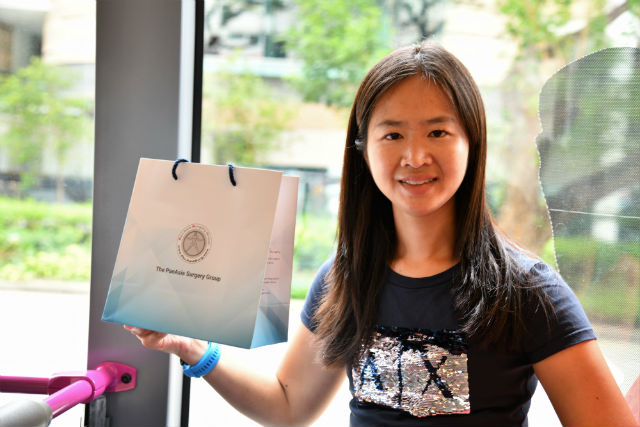
Nutritional supplements on the other hand, are capsule or tablet-based packages of vitamins, minerals and other micronutrients that we can take, to provide our body with the nutrients that we may be lacking from food that we are consuming.
A nutrient-dense meal at Cedele to improve gut health
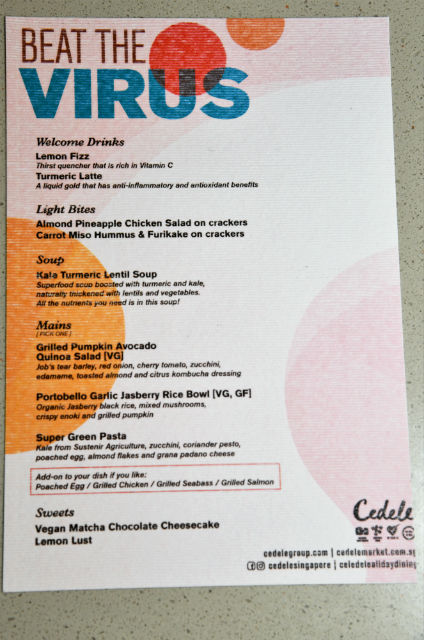
Following Dr. Look’s talk, media guests were then treated to a yummy four-course meal at Cedele, containing nutrient-dense foods to help boost our gut health and immunity levels.
This meal began with a choice of two welcome drinks, a Lemon Fizz, which is rich in Vitamin C, as well as Tumeric Latte, which has anti-inflammatory and antioxidant benefits.
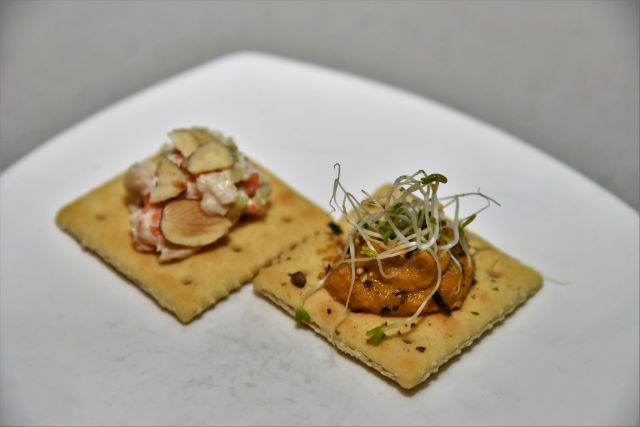
We were then served with two types of canapés, these were Almond Pineapple Chicken Salad and Carrot Miso Hummus Furikake, both atop crackers.
These items are all superfoods that are rich in nutrients.
Pineapples are rich in Vitamin C, fibre, and potassium content which promotes heart health while almonds are high in fibre, protein, magnesium and vitamin E.
Carrots contain beta carotene, a pigment that converts vitamin A in the body and helps improve vision. As well, the beta carotene in carrots are also an antioxidant that can help reduce the risk of certain cancers.
And Miso, a type of fermented soya bean, is linked to a variety of health benefits, including better digestion and a stronger immune system.
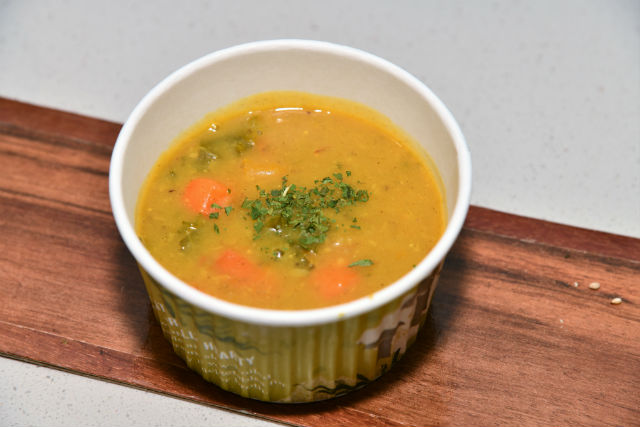
For the soup course, we had the Kale Tumeric Lentil Soup, which is full of nutrient-dense superfoods to boost our gut health and immunity. The soup was delicious at the same time.
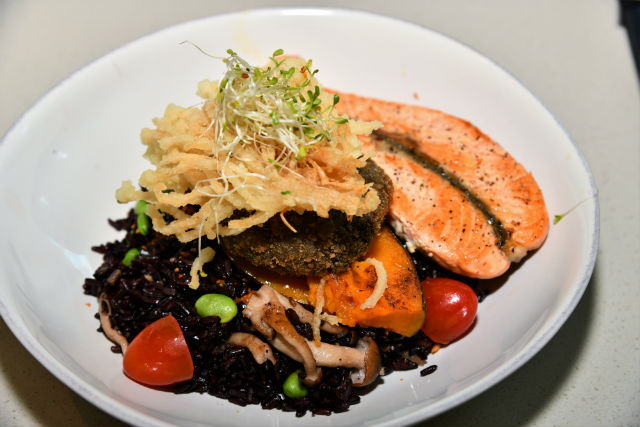
With a choice of three main courses, the one I chose was the Portobello Garlic Jasberry Rice Bowl, containing organic jasberry rice, mushrooms, crispy enoki and dried pumpkins.
Containing 40 times more antioxidants than brown rice, 4 times more antioxidants than quinoa and 7 times more antioxidants than kale, jasberry rice is considered as one of the newest superfood in the market.
And mushrooms are rich in B vitamins as well as containing a powerful antioxidant called selenium, which helps to support the immune system and prevents damage to the body’s cells and tissues.
I added a portion of grilled salmon into my rice bowl, which is rich in omega-3 fatty acids, and according to research, this can help reduce the risk of cardiovascular disease.
The other two main courses had also been rich in superfoods – these had been a Grilled Pumpkin Avocado Quinoa Salad and a Super Green Pasta, the latter containing nutrient-dense ingredients such as kale, zucchini, poached egg and almond flakes.
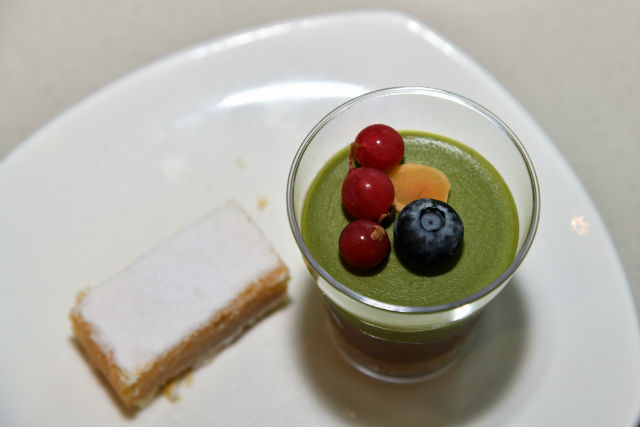
To end off the meal, we were given a Vegan Matcha Chocolate Cheesecake as well as a Lemon Lust cake.
Both Matcha and dark chocolate are rich in immunity-boosting antioxidants, while Lemon has a high Vitamin C content, which also helps to strength the immune system and therefore improving gut health.
Conclusion
I walked out of the session feeling satisfied, enriched and enlightened, armed with new tips and tricks on what to do in order to improve my body’s immunity.
I would say that I definitely had learn a lot about gut health from Dr. Look and how it affects the body’s natural immunity.

Informative read, and I applaud the doctor for his advice to “stop eating sugars” as not only are they very damaging to health, they are ubiquitous everywhere in modern man’s diet unfortunately.
Possible to share his slides please? Many thanks
Hi June, thanks for your comments. Yeah, we’re increasingly beginning to realise the harmful effects of sugar and how bad it is for the human body.
Regarding the slides, I’ll need to check with the organiser and see if that’s possible.
Hey June, PanAsia Surgery just got back to me. Unfortunately the slides are for media reference only, not for distribution. So I’m not able to share them. So sorry about this.